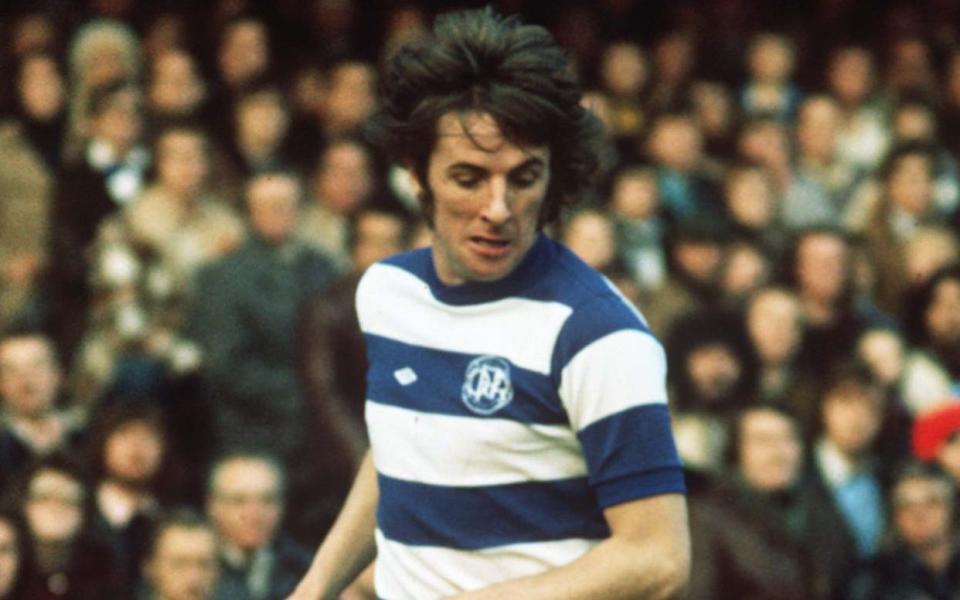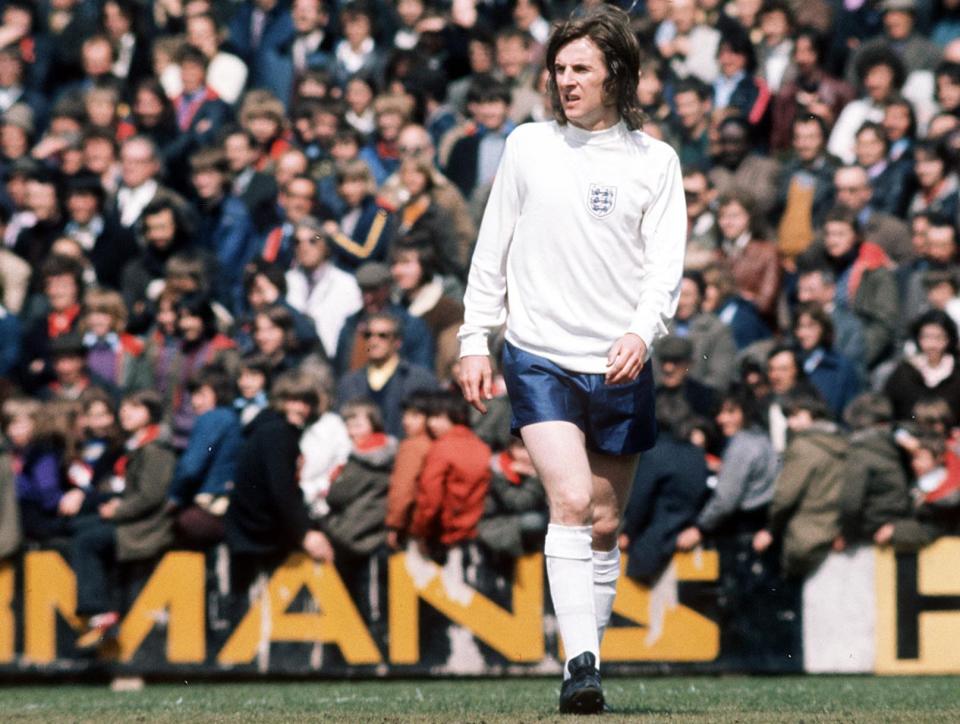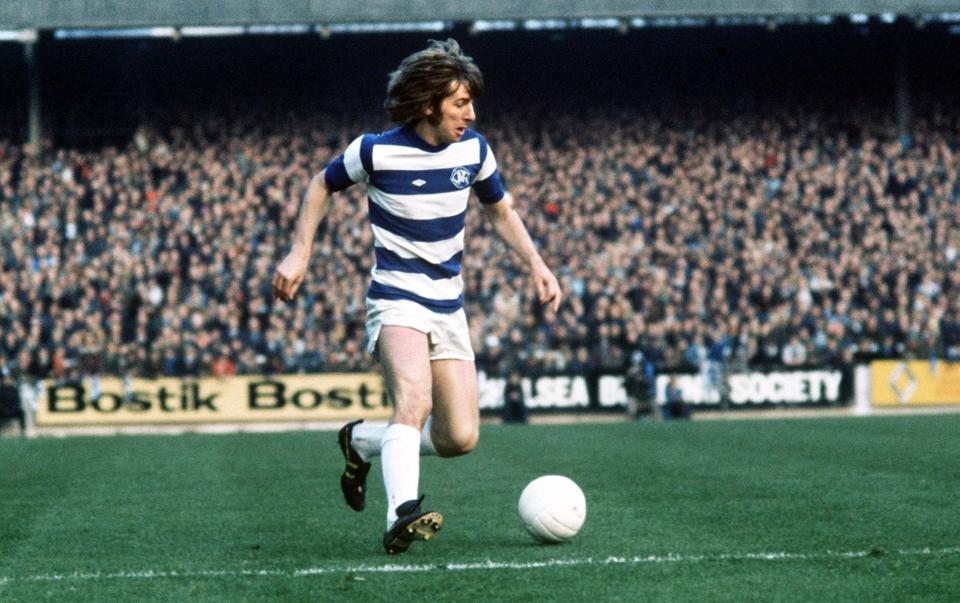Stan Bowles: Football maverick dies aged 75

Stan Bowles, the former Queens Park Rangers and Manchester City forward and one of the great mavericks of English football, has died at the age of 75.
His death follows a long battle with Alzheimer’s disease, which was first diagnosed nine years ago.
Bowles, who was capped five times by England, enjoyed a colourful 17-year playing career at a host of clubs including City, Nottingham Forest and Brentford but he was most closely associated with QPR where he became a cult hero.
Voted the club’s all-time greatest player in a supporters’ poll in 2004, Bowles joined QPR in 1972 and inherited the No 10 shirt vacated by fan favourite Rodney Marsh.
Bowles became the star player in arguably QPR’s greatest side during the 1970s when he scored 97 goals in 315 appearances over seven years at the club.
Earning a reputation as one of the great non-conformists of English football, Bowles’ playing style and flamboyance on and off the field endeared him to QPR fans.
He helped QPR to win promotion to England’s top flight in his debut season and played an influential role in helping the club finish second under Dave Sexton in 1976, when they missed out on the title by a point to Liverpool. It remains their highest ever league finish.

In a statement on their X account, QPR said: “It is with a heavy heart we have learned that QPR legend Stan Bowles has passed away.
“A footballing icon and arguably the greatest to have ever worn our famous blue and white hoops.
“All our thoughts are with his family and friends at this sad time. RIP, Stan. Forever R’s.”
Bowles’ 1996 autobiography revealed the extent of his drinking, womanising and gambling during his playing days. He would later bemoan the loss of characters in the game. “It’s boring,” he said in an interview in 2010. “There’s some brilliant players, don’t get me wrong, but no characters. They can’t relate to the fans any more.”
Born in Collyhurst in Manchester in 1948, Bowles began his career at City and spent three seasons at the club before spells at Bury, Crewe and Carlisle preceded his transfer to QPR.
He would infamously fall out with many of his former managers and lasted just a season under Brian Clough at Nottingham Forest. Bowles ruled himself out of Forest’s European Cup final in 1980 after falling out with Clough.
From there, Bowles joined Leyton Orient in 1980 before finishing his career at Brentford, where he retired in 1984.
The word ‘maverick’ could have been invented for Stan Bowles
There was a Who’s Who of football legends in attendance when the Jeff Astle Foundation staged a fundraising dinner in 2017.
Sir Geoff Hurst and Gordon Banks, two icons of 1966, were among those making speeches but the man who made most heads turn that night was tragically no longer capable of holding a conversation.
Smartly dressed in a suit and trademark trilby hat, and looking barely an ounce over his playing weight, the sight of Stan Bowles was a reminder that it is not just the games, goals and trophies that live longest in the minds of football fans.
It is how their heroes played the game, how that made them feel, and the window that they provided into their personality. Flaws and all.
And Bowles was so beloved not just because he was an authentically great player – 97 goals in 315 league matches at Queens Parks Rangers confirms that description – but for the way that he entertained.
A throwback to a less professionalised era of rather more on-field smiles, the word maverick could have been invented for Bowles. He once remarked that he “blew the lot on vodka and tonic, gambling and fags”, before noting one particular regret: “I think I overdid it on the tonic.”

And it was Ernie Tagg, Bowles’s manager at Crewe, who even more famously said: “If Stan Bowles could pass a betting shop like he can pass a football he’d be a rich man.”
Bowles never took himself seriously enough to dwell on such observations and, while just five England caps pointed to an only partially fulfilled talent, what he delivered was frequently still spectacular.
Brought up in the Moston area of Manchester, word soon spread during the 1960s of a wafer-thin prodigy who, for all his physical disadvantages, had comparable guile and flair to another Manchester-based rebel called George Best. By the age of 13, Bowles had been banned from the annual fair because he kept winning at a sideshow that offered a cash prize to anyone who could kick a football at half a dozen tiny targets.
He made his debut for Manchester City at the age of 18 and scored twice. He scored twice again in his next game but fell out with the manager Malcolm Allison before eventually arriving at his spiritual Loftus Park home via Bury, Crewe and Carlisle. It was in West London that he would jink, feint and dribble QPR all the way to the brink of the old First Division title in 1976.
But he was viewed as an extravagant risk by the England managers of the day – Sir Alf Ramsey, Joe Mercer, Don Revie and Ron Greenwood – and, having been sold by Tommy Docherty at QPR, also fell out of favour with Brian Clough during a brief spell at Nottingham Forest.
Bowles would still finish his playing career in some style at Brentford (where he was also voted the club’s greatest ever player) before moving into after-dinner speaking, punditry and a betting column. During an interview with The Telegraph in 2016, Bowles’s daughter Andrea noted that he only ever had one job outside football, working for the family window-cleaning business when he was 15. “And my grandad sacked him from that after one day,” she recounted with a smile.
Bowles was only 64 when he was diagnosed with dementia and Andrea became his main support. “He always used to come here when he had nowhere else to go after he got kicked out by his latest woman,” she said, recalling how he abruptly arrived at her Manchester home in 2013 and then never left. “I could tell straight away he wasn’t right … just little things … but they began to mount up,” she said. Bowles’s final years were unbearably sad, but he and his family faced up to his dementia diagnosis with great bravery and he continued to make public appearances for just as long as possible.
QPR would regularly invite him to matches and, while he might not have understood everything that was happening, a still impish smile whenever he was introduced to fans pointed to an unbreakable connection.
Even when Bowles reached the point of being unable to speak or eat solid foods, Andrea would marvel at her father’s “superhuman strength” and restless energy.
There was, of course, also a trace of the supernatural about the way he played football, even if the man himself always seemed baffled by the fuss. “I played it for fun,” he once explained. “I didn’t think about it. I found it easy. I taught myself, knocking a ball about, up against a wall. I wasn’t really bothered about making money from football. To me it was like a Sunday morning game – you get there late, you put your kit on, and away we go… I just made it up as I went along.”

